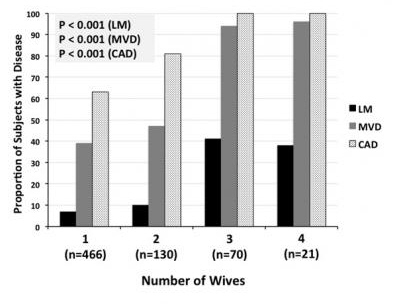A recent prospective multicenter observational study assessed the effect of polygamy on cardiovascular health and found a significant association between number of wives and the presence of coronary artery disease (CAD), left main disease (LMD) and Multivessel disease (MVD). Risk increased with the number of wives. After adjusting for baseline differences, the researchers showed that men who practiced polygamy had a 4.6-fold increased risk of CAD, a 3.5-fold increased risk of LMD and a 2.6-fold elevated risk of MVD.
That was even for men with up to four concurrent wives who didn't reside in the same house.

Association between number of wives and coronary artery disease. Credit: Dr Daoulah
The samples included consecutive patients referred for coronary angiography at 5 hospitals in Saudi Arabia and the United Arab Emirates. CAD was defined as more than 70% narrowing in a major epicardial blood vessel or more than 50% in the left main artery (LMD). MVD was defined as more than one diseased vessel.
The 687 married men in the study had an average age of 59 years and 56% had diabetes, 57% had hypertension and 45% had a past history of CAD. Around two-thirds of the men had one wife (68%) while 19% had 2 wives, 10% had 3 wives and 3% had 4 wives. There were significant baseline differences according to the number of wives. Men with more than 1 wife were more likely to be older, live in a rural area, have a higher income and have a history of coronary artery bypass grafting (CABG).
Speculation is that the need to provide and maintain separate households multiplies the financial burden and emotional expense. Each household must be treated fairly and equally, and it seems likely that the stress of doing that for several spouses and possibly several families of children is considerable, which leads to heart disease. However, unmeasured confounding variables such as physical activity, level of intimacy, dietary habits and genetic effects from interbreeding with close relatives would need to be analyzed in greater depth as they may influence the outcome.
Coronary heart disease and polygamy is only an association and not necessarily a root cause.
Professor Michel Komajda, a past president of the European Society of Cardiology and course director of the European Society of Cardiology program APSC 2015 currently being held in Abu Dhabi, said, "We know that long-term stress in family life increases the risk of coronary heart disease (CHD)2 and it would be interesting to see what effect polygamy had on wives' CHD risk. People with psychosocial risk factors are less likely to take cardiac medications, which could be relevant in the group with prior CABG. Extra support may be needed to adhere to prescribed drugs and change lifestyle."





Comments